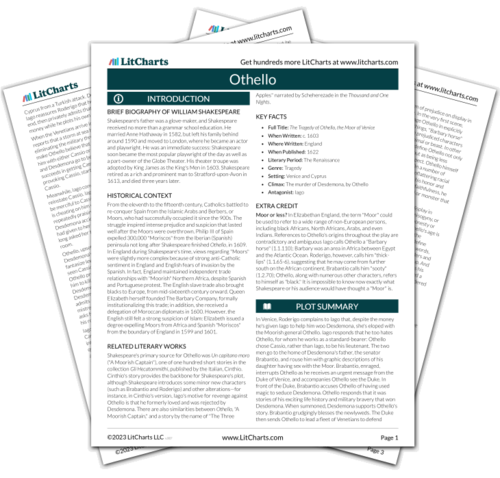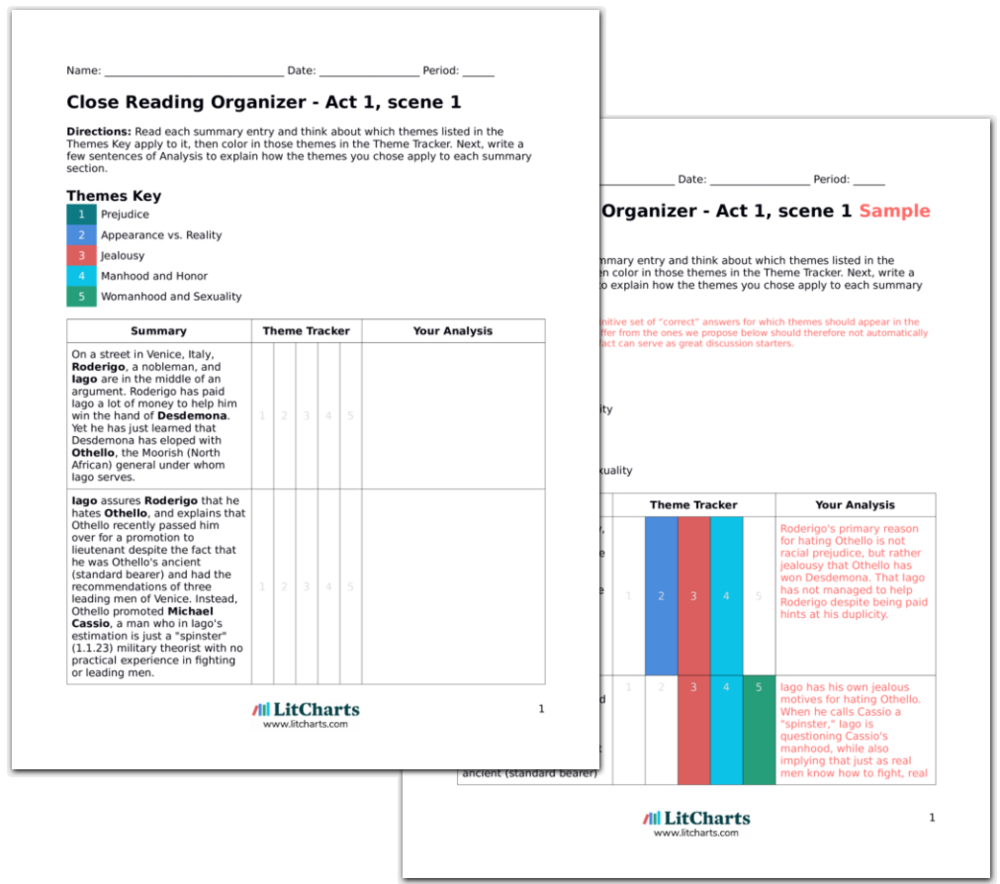![]()
LitCharts assigns a color and icon to each theme in Othello, which you can use to track the themes throughout the work.
![]()
![]() Reality Theme Icon" />
Reality Theme Icon" />
![]()
![]()
![]()
Othello enters Desdemona's quarters, holding a candle. Standing over Desdemona as she sleeps, he admires her beauty, kisses her, and is almost moved to let her live—noting that, like a flower, once plucked, she cannot be given "vital growth" (5.2.14) again. But, finally resolving to kill her, he moves to do so.
In comparison to his frantic, epileptic state in the prior scenes, Othello now seems dignified. He describes Desdemona's beauty and his own longing and anguish using traditional terms, which are beautiful but also underscore the traditional masculine values spurring him to kill the "loose" Desdemona.
Active Themes![]() Reality Theme Icon" />
Reality Theme Icon" />
![]()
![]()
Just then, Desdemona wakes. She calls out to Othello , who answers, and then tells her to pray in preparation for her to death. Terrified, Desdemona begs to know why Othello is going to kill her. He tells her that he has seen Cassio with her handkerchief. When Desdemona denies giving Cassio the handkerchief, Othello tells her that Cassio has confessed to sleeping with her and, in punishment, has been killed by Iago . Desdemona begins to weep, which only infuriates Othello since he believes that she is crying for Cassio. He struggles with Desdemona as she begs to be first banished instead of killed and then allowed to live just a few minutes more. Othello is implacable, though, and smothers Desdemona with a pillow.
By refusing to even listen to Desdemona's denials of her suspected infidelity, Othello reveals how fully he has lost his independent perspective and succumbed to Iago's web of illusions. In fact, he refuses even to let her live a bit longer so she can prove her innocence. He is not interested in her innocence, in her pleas to be given a chance to explain the truth behind appearances, because he is so consumed by the "monster" of jealousy that he is certain that she is guilty.
Active Themes![]() Reality Theme Icon" />
Reality Theme Icon" />
![]()
![]()
![]()
Emilia calls from the doorway. Othello mistakes her calls as noises made by Desdemona , and smothers Desdemona again.
Othello can't analyze reality—he can't even differentiate between Emilia's and Desdemona's voices. Active Themes![]() Reality Theme Icon" />
Reality Theme Icon" />
![]()
![]()
Finally, Othello realizes that it is Emilia who is calling. He draws the curtains back around the bed to hide Desdemona 's body. Then he goes to speak with Emilia, expecting her to tell him of Cassio 's death. Othello is shocked to learn from Emilia that Cassio killed Roderigo but is himself still alive. Then, suddenly, Desdemona calls out that she has been murdered.
The slow pace of Desdemona's death stretches out its brutality and the terrible consequences of Othello's delusion. The news that Cassio has killed Roderigo is the first sign of Iago's plots unraveling. That these two things happen almost simultaneously heightens the play's tragedy.
Active Themes![]() Reality Theme Icon" />
Reality Theme Icon" />
![]()
![]()
"My students can't get enough of your charts and their results have gone through the roof." -Graham S.

Emilia opens the curtains and to her horror sees Desdemona , who with her dying breaths says that she is innocent, but then denies that she was murdered and instead says that she committed suicide. Desdemona dies.
In changing her story, Desdemona tries to spare Othello from the punishments he will receive, proving her love and devotion to him to the very last.
Active Themes![]() Reality Theme Icon" />
Reality Theme Icon" />
![]()
![]()
Though Emilia does not appear to suspect him, Othello voluntarily (and almost proudly) admits that he killed her for being unfaithful to him. Emilia denies that Desdemona was ever false to him, but Othello counters that it was "honest, honest Iago " (5.2.156) who showed him the truth.
However, Othello does not seek to profit from Desdemona's own attempt to "direct" a scene to his benefit. The repetition of "honest" in his description of Iago compounds the tragedy by highlighting how completely he was duped.
Active Themes![]() Reality Theme Icon" />
Reality Theme Icon" />
![]()
![]()
Emilia is dumbfounded as she digests this information, but recovers herself enough to say that Iago was lying and to condemn Othello 's actions. Othello threatens Emilia to keep quiet, but Emilia is unafraid, saying "Thou hast not half that power to do me harm / As I have to be hurt" (5.2.169–170). She calls out that "The Moor hath killed my mistress" (5.2.174).
Emilia, who understands Iago far better than the gullible male characters have so far, demonstrates her loyalty to Desdemona by risking her own safety and defying the murderer of her former mistress, despite his obvious willingness to do violence.
Active Themes![]() Reality Theme Icon" />
Reality Theme Icon" />
![]()
![]()
Montano, Gratiano , and Iago enter. Othello admits once more, this time to Gratiano, Desdemona 's uncle, that he smothered Desdemona. Gratiano is shocked, and says that it is a good thing that Brabantio died from grief at Desdemona's marriage so that he did not live to see this.
The speed with which Othello is transformed from respected general to reviled outsider reveals the strength of prejudices more or less repressed by other characters throughout the majority of the play. Once there's reason to exclude him from the social group, Othello quickly is diminished to the status of outsider among the Venetians.
Active Themes![]()
![]() Reality Theme Icon" />
Reality Theme Icon" />
![]()
Meanwhile, despite Iago's demands that she obey him and be quiet, Emilia begins to piece together what happened. Othello insists again that Desdemona was unfaithful and brings up the proof of the handkerchief . Now Emilia explodes in anger, and explains that she was the one who found the handkerchief and gave it to Iago.
Iago tries to control Emilia, commanding her as his wife to be silent. But she shows her independence and loyalty to both Desdemona and to the truth. Othello, meanwhile, his crime staring him in the face, now can only preserve his honor by insisting that Iago's version must be the truth.
Active Themes![]()
![]()
![]()
Realizing that Iago lied to him, Othello attacks Iago, but is disarmed by Montano. In the uproar, Iago stabs Emilia and flees. Montano chases after Iago while Gratiano stays to guard the door. Othello is left with the body of Desdemona and the dying Emilia. Emilia sings a verse of the song "Willow," and dies while telling Othello that Desdemona was faithful to him.
Othello killed Desdemona because he thought she betrayed him. Iago kills Emilia because she did betray him—but she betrayed him for the greater good, and Iago's violence toward her is more graphic and terrible than the smothering of Desdemona, bringing home his full villainy. All through the play the male characters have talked about and feared women as possibly deceitful betrayers, particularly sexual betrayers. But not one woman in the play actually behaved that way. Desdemona died as she lived, with love and fidelity for Othello despite his awful treatment of her. Emilia did betray Iago, but her betrayal was the opposite of deceitful—it was heroic. She put herself in mortal danger by putting her loyalty to Desdemona and to the truth above her loyalty to her duplicitous husband. In this way the play condemns all of the male character's misogyny, whether it manifested as cruelty or insecurity.
Active Themes![]()
![]()
![]()
Othello searches his chamber and finds a sword. Gratiano enters to find Othello armed and mourning Desdemona . Moments later Lodovico and Montano enter with Iago , whom they've captured. Cassio also enters, carried in on a chair. Othello immediately stabs Iago, who is injured but not killed. Othello is disarmed by Lodovico's men. Othello then begs to know why Iago did what he did, but Iago refuses to speak at all. Lodovico, however, has found two letters in Roderigo 's pocket that reveal all of Iago's schemes.
Cassio's relative restraint, despite having been wounded by Roderigo and Iago and mistrusted by Othello, reveals his strength of character, which contrasts with Iago's increasingly sadistic malice as the extent of his plot is revealed. By refusing to speak, Iago retains some of the directorial control of events that he has striven for throughout: he never reveals his inner reality to the other characters.
Active Themes![]() Reality Theme Icon" />
Reality Theme Icon" />
![]()
Now Lodovico turns to Othello , and tells him that he must give up his command and return with them to Venice. In response, Othello asks that when they speak of what has happened they "speak of me as I am . as one that loved not wisely but too well" (5.2.344). Then Othello tells a story about a time when he once defeated and stabbed a Muslim Turk who had killed a Venetian, and as he describes the stabbing he takes out a hidden dagger and stabs himself. He falls onto the bed next to Desdemona and dies while giving her a final kiss.
Othello, now comprehending everything, shows frank, deep remorse. His curious final anecdote asserts his rightful membership in Venetian society. In a gesture reminiscent of how other characters (Iago, Roderigo, Brabantio) have drawn on racial stereotypes to exclude Othello and cement their own relationships, he here defines himself as an "insider," a Christian, against the "outsider" or enemy, the Turk. Yet, at the same time, when he tells of stabbing the Turk, he also stabs himself. In effect, he is defining himself as both an insider and an outsider, someone who defended Venice but was nevertheless seen as both a possible enemy and an animal by other Venetians.
Active Themes![]()
![]() Reality Theme Icon" />
Reality Theme Icon" />
![]()
Lodovico demands that Iago look upon the destruction he has caused. He notes that Gratiano is Othello 's heir, and says that Cassio is to carry out the execution of Iago. Then he departs to carry the sad news to Venice.
In the final moment of the play, Iago, who has directed action throughout, ends up as a spectator to his own misdeeds.
Active Themes![]() Reality Theme Icon" />
Reality Theme Icon" />

“Would not have made it through AP Literature without the printable PDFs. They're like having in-class notes for every discussion!”
Get the Teacher Edition
“This is absolutely THE best teacher resource I have ever purchased. My students love how organized the handouts are and enjoy tracking the themes as a class.”
Othello in Plain English
“Every teacher of literature should use these translations. They completely demystify Shakespeare. Students love them!”
Copyright © 2024 All Rights Reserved Save time. Stress less.AI Tools for on-demand study help and teaching prep.
 Quote explanations, with page numbers, for over 44,324 quotes.
Quote explanations, with page numbers, for over 44,324 quotes. PDF downloads of all 2,003 LitCharts guides.
PDF downloads of all 2,003 LitCharts guides. Expert analysis to take your reading to the next level.
Expert analysis to take your reading to the next level. Advanced search to help you find exactly what you're looking for.
Advanced search to help you find exactly what you're looking for.
 Expert analysis to take your reading to the next level.
Expert analysis to take your reading to the next level. Advanced search to help you find exactly what you're looking for.
Advanced search to help you find exactly what you're looking for.